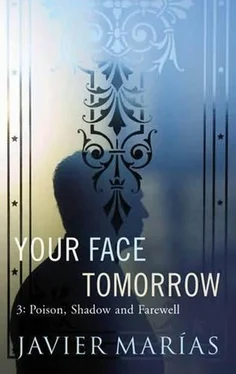Once in Oxford, I walked from the station to the Randolph Hotel and phoned him from there (now that I knew Luisa used a cell phone, perhaps I ought to get one too, they may be instruments of surveillance but they have their uses). Mrs. Berry answered and didn't even think it necessary to hand me over to Peter. She would ask him, she said, but she was sure my visit would make his day. A few seconds later, she was back: 'He says you should come at once, Jack, as soon as you like. Will you be staying for lunch? I'm sure the Professor won't let you leave before then.'
When I went into the living room, I experienced a moment of alarm-but not quite panic-because Peter's face had taken on the gaunt look of those whom death is pursuing although without as yet too much haste, not yet holding the hourglass in his hand, but keeping a close eye on it. That impression soon diminished, and I decided it must have been a false one, but it may also have been due to a rapid adjustment, as when we meet a friend who is much fatter or thinner or older than the last time we saw him and we are thus obliged to carry out a kind of rectification process, until our retina gets used to our friend's new size or new age and we can again fully recognize him. He was sitting in his armchair, like my father in his, with his feet on an ottoman and the Sunday papers scattered on a low table beside him. His stick was hooked over the back of his chair. He made as if to get up to greet me, but I stopped him. Judging from the way he was settled in his armchair, it seemed to me unlikely that he would find it as easy to sit down on the stairs as he had done very late on the night of his buffet supper. I placed one hand on his shoulder and squeezed it with gentle or restrained affection-that was the most I dared to do, for in England people rarely touch each other. He was impeccably dressed, with tie and lace-up shoes and a cardigan, as was, I believe, customary among men of his generation, at least I had noticed the same tendency in my father, who, when he was at home, always looked as if he were about to go out at any moment. Then, impatient to begin, I sat down on a nearby stool and the first thing I did, after exchanging a few words of welcome and greeting, was to remove from my bag the package containing La Guerra Civil en dos mil carteles-The Civil War in Two Thousand Posters -the next time I went to Madrid I would have to track down another copy for myself; it really was a marvelous book, and I was sure that Wheeler would appreciate and enjoy it greatly, as would Mrs. Berry, whom I urged to stay and leaf through it with us. However, she preferred not to ('Thank you, Jack, I'll look at it properly when I have more time'). And she left us on the excuse that she had things to do, although throughout the morning, she came back into the room several times, came and went, always near, always on hand.
'Look, Peter,' I said, opening the first volume, 'the book also reproduces various foreign posters too, and I've stuck post-its on any pages that have posters connected to the "careless talk" campaign. It seems that, as a recommendation, it was pretty much a constant in all kinds of places. The British campaign was imitated by the Americans when they finally entered the War, but theirs sometimes verged on the kitsch and the melodramatic 'And I showed him a drawing depicting a dog grieving for its dead sailor master '…because somebody talked!' or as we would say in Spanish: ' ¡. .. porque alguien se fue de la lengua!'; another in which appeared a large hairy hand wearing a Nazi ring and holding a Nazi medal and the words: 'Award for careless talk. Don't discuss troop movements, ship sailings, war equipment'; and a third more somber one, in which a pair of intense narrow eyes peer out from beneath a German helmet: 'He's watching you.' And there are two English posters that I
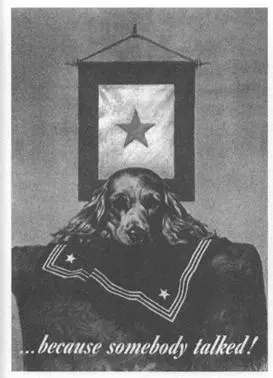
don't think you showed me, but that you're bound to remember.' And I turned to a page displaying a very succinct poster bearing only the words 'Talk kills,' the lower half of which showed a sailor drowning as an indirect or possibly direct result of someone talking; and another signed by Bruce Bairnsfather, which revived his famous soldier from the First World War, 'Old Bill,' alongside his son who has been called up for the Second.
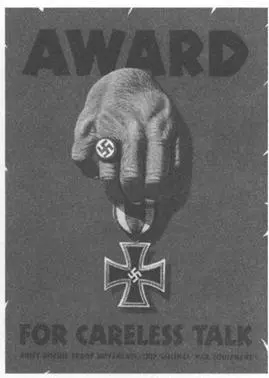
At the top are the words: 'Even the walls…' next to a swastika and above a huge ear; and underneath are written the young man's words: 'S'long Dad! We're shiftin' to… Blimey. I nearly said it!' And I pointed out to him a French poster, signed by
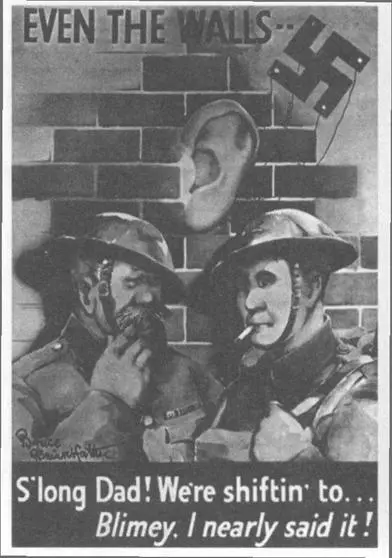
Paul Colin: 'Silence. The enemy is listening in to your secrets' and a Finnish one, although the words were in Swedish, that showed a woman's full red lips sealed shut by an enormous padlock, and the text of which apparently said: 'Support our soldiers from the rearguard. Don't spread rumors!'; and a Russian poster in which one half of the listener's face and shoulders was much darker and had acquired a monocle, a mustache and a military epaulette (had taken on, in short, a very sinister appearance). And here are the Spanish posters,' I added, leafing through the second volume where most of them were to be found, although they were scattered throughout both. 'You see, these must have predated the British ones and the others too.'
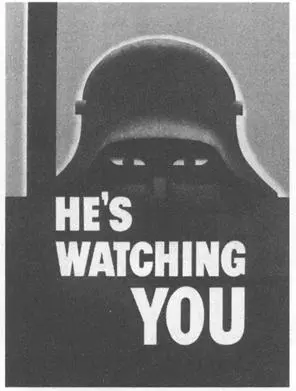
Wheeler studied them closely and with evident interest, even fascination, and after a moment's silence, said:
'They're different. There's more hate in them.'
'In the Spanish ones?'
'Yes, if you look at ours and even those from the other countries, they were warning people above all of the danger and urging them to keep silent,
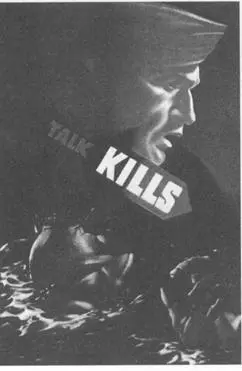
to maximize discretion and caution, but they didn't demonize the hidden enemy or stress the need to hunt him down, to pursue and destroy him. It's odd, they hardly condemn him at all. Perhaps because we were conscious that whenever possible, we were doing exactly the same thing, spying in Germany and in occupied Europe and were aware that in wartime, it's only to be expected (and so, propaganda apart, one can't really be too reproachful) that each side will do whatever
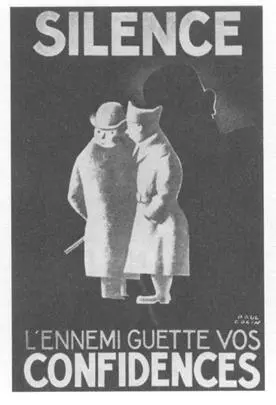
it can to win that war, with no limits, or only those demanded by public opinion, which doesn't, of course, mean that the limits we're told, officially, that governments won't cross are never crossed, only that they cross them furtively, in secret, without acknowledging the fact and even denying it, if that's what's required. But look at this: "Find him out and denounce him," and they depict the spy as a monster with elephantine powers of sight and hearing as well as smell, and they associate him with Italian fascism, and I'm not sure, but he may even be wearing a priest's biretta on his bald head, what do you think that is? Not to mention this other one: "Find and ruthlessly crush the Fifth Column" whose members are shown as a handful of plundering, bloodthirsty rats caught in the light of a torch, with the sole of a giant shoe about to flatten them and a spiked bludgeon about to batter them. The poster was obviously published by the Communist Party, which was dominated by Soviet Stalinists, and they called for both the enemy and the halfhearted to be mercilessly hunted down and unceremoniously killed, just as the Francoists on the other side did.
Читать дальше
